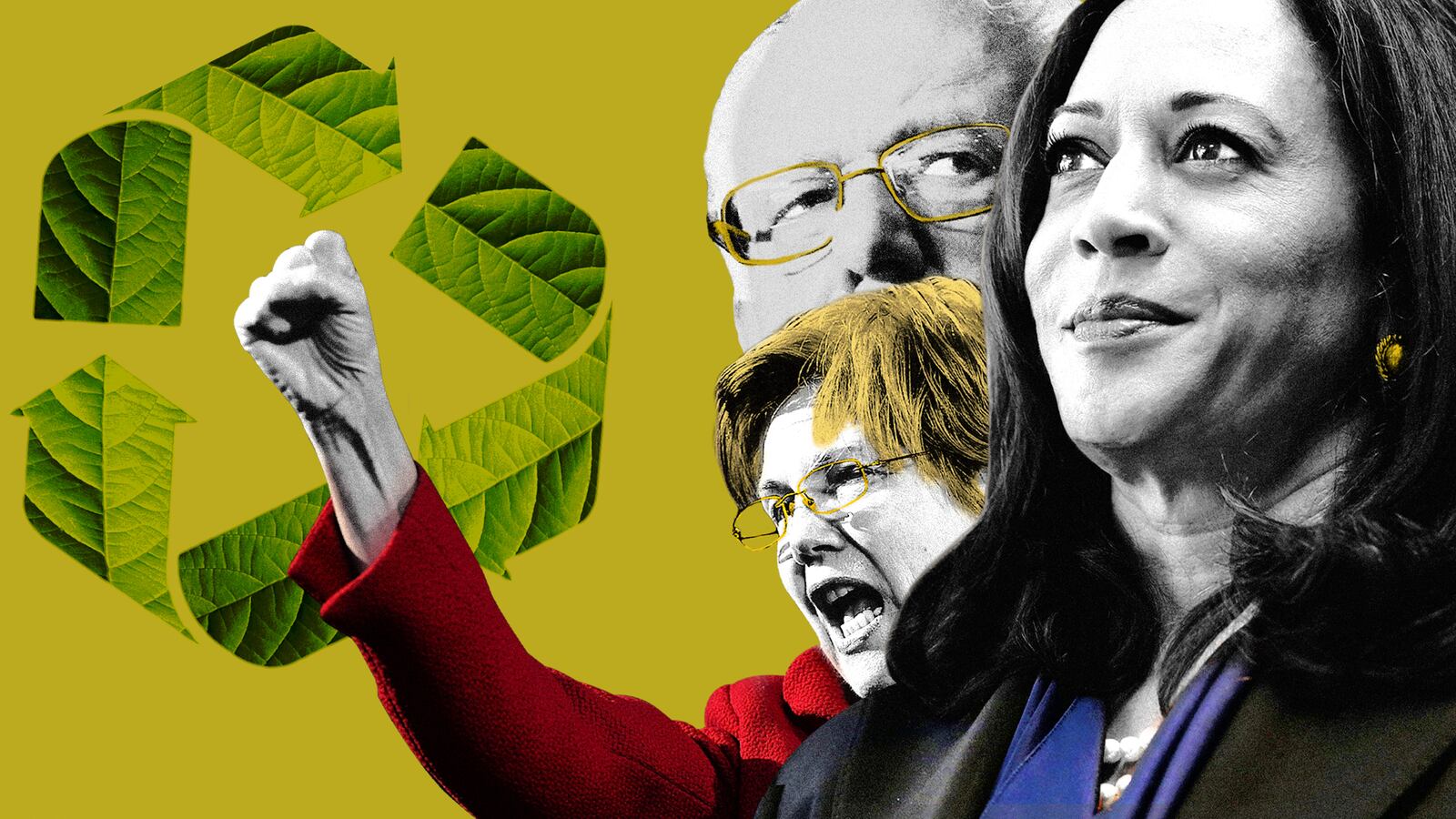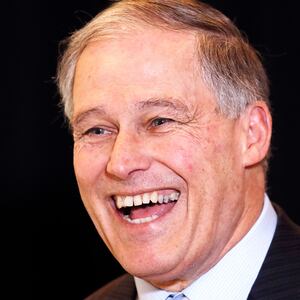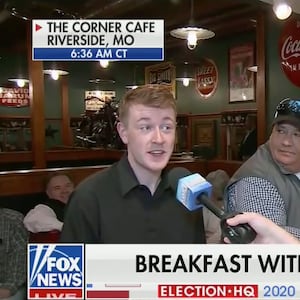Last week, Democratic presidential candidate Gov. Jay Inslee called on the Democratic National Committee to hold a climate change-specific debate, calling the topic (and his campaign platform) “the defining challenge of our time.”
“Each 2020 nominee needs to have a concrete plan to address climate change—and we deserve to hear those plans,” he wrote in an email to supporters.
Though he may be the only candidate to make climate change a centerpiece, that sort of rhetoric is far from uncommon in the crowded Democratic field. Bernie Sanders has called it “the single greatest threat facing our planet.” Elizabeth Warren says it is “an existential threat.” Kamala Harris trolled the president by dubbing it “a real national emergency.”
The candidates seem to agree on the need to address the issue—but do they agree on how to do so? And do their records suggest they have it in them to meet the challenge?
The Green New Dealers
As the primary proponent of the climate-centric debate, Gov. Inslee’s policy ideas may be the best place to start in assessing the field’s climate credentials. Though his full plan has yet to be revealed, Inslee’s “Climate Mission” will focus on a path to 100-percent renewable energy, and an end to subsidies for fossil fuel companies, among other proposals.
Inslee’s broad-strokes plan somewhat resembles the Green New Deal, a resolution introduced in Congress by Rep. Alexandra Ocasio-Cortez (D-NY) and Sen. Ed Markey (D-MA) that includes goals of zeroing out greenhouse gas emissions, investing in infrastructure and jobs programs, and more. The resolution now boasts several 2020 candidates among its co-sponsors, including Warren, Harris, Sanders, Kirsten Gillibrand, Cory Booker, and Amy Klobuchar.
Keep It In the Ground
The Green New Deal, as of yet, doesn’t contain detailed road maps toward those goals, and most candidates haven’t really offered much in the way of specific proposals just yet. One exception, as is the case in many policy areas, is Elizabeth Warren, who recently put forth a plan to end all new leases for fossil fuel extraction on public lands. This would be relatively significant—coal, oil, and natural gas produced on public lands accounted for almost one quarter of all U.S. carbon dioxide emissions at last count.
Sanders agrees with this, according to a spokesperson for his campaign. “Bernie believes we should keep oil, gas, and coal in the ground,” she said in an email. “This means a ban on fossil fuel extraction from public lands, a moratorium on new fossil fuel infrastructure, a ban on fracking, and an end to the export of coal, natural gas, and crude oil.” A spokesperson for Cory Booker confirmed that he is also on board with a moratorium on fossil fuel leasing on public lands, and she also pointed out that he was a co-sponsor of the “100 by ‘50 Act,” a bill introduced by Sen. Jeff Merkley (D-OR) that calls for a transition to 100 percent renewable energy by mid-century.
Paris and Beyond
Outright bans would clearly help the emissions picture, but there are other mechanisms in play as well. Some candidates—such as Julian Castro, Booker, and Gillibrand—have expressed support for some form of a carbon tax as a way to move the country away from fossil fuels. Others, including Amy Klobuchar and Eric Swalwell, seem open to the possibility but haven’t committed to the idea as of yet.
All the candidates would rejoin the Paris Agreement, from which President Trump announced the country will withdraw (the U.S. cannot formally withdraw until November 2020, based on the terms of the agreement), though some including Andrew Yang and Tim Ryan have stated that it does not go far enough in its targets.
Time to Debate?
In calling for the climate-specific debate, Inslee has suggested that the issue requires that sort of space and time to talk through the complex details of actually achieving meaningful emissions reductions. . “This is an urgent problem, and we can’t resolve it with soundbites and one-off questions,” he wrote on Earth Day, in an open letter to the rest of the 2020 Democratic field, in which he invited them all to support the debate idea.
So far, a few have agreed: Sen. Gillibrand told The Daily Beast last week that a climate-specific debate “would show the world that America intends to lead again on this issue,” and that it would allow for in-depth discussion of some of the Green New Deal’s basic ideas.
Julián Castro, the former mayor of San Antonio and Secretary of Housing & Urban Development in the Obama administration, tweeted out his support; a spokesperson for his campaign confirmed this in an email, adding that “climate change is the most pressing global challenge we face.
Like most candidates, though, Castro’s spokesperson said that a concrete climate policy is still “in the pipeline.”
Voting Records and Fossil Fuel Ties
Without detailed proposals, perhaps prior records might offer a hint to how the candidates might treat the issue. The League of Conservation Voters maintains an environmental scorecard for members of Congress; the declared candidates range in lifetime score from 92 percent (Ryan, Sanders) up through 100 percent (Harris), meaning all of them have solidly pro-environment voting records. (Joe Biden, at 83 percent for his time in the Senate, would bring up the rear in that regard.) Just for comparison: the Republicans who ran in 2016 had an average score of under 8 percent.
Those scores for the Democratic field, along with their public statements supporting strong climate action, suggest there may not be much distance between them.
But there are some questionable spots. Former Colorado governor John Hickenlooper is known to have strong ties to the oil and gas industry, and wrote in a 2016 memoir that fracking for natural gas was “good for the country’s energy supply, our national security, our economy, and our environment.” Castro also has a history of supporting fracking projects, and Beto O’Rourke twice voted to lift bans on crude oil exports.
Most of the 2020 field has signed on to the No Fossil Fuel Money pledge, agreeing not to accept donations from the industry. But not the entire field: eight declared candidates have yet to sign, including Klobuchar, Booker, Harris, O’Rourke, Hickenlooper, Ryan, Castro, and John Delaney.
Elevating the Issue
As the race continues to take shape, environmental advocacy groups are mostly just happy that climate is occupying a relatively prominent position in public discussions. “I'm celebrating the fact that climate is so central to the process right now,” said Kevin Curtis, executive director of the NRDC Action Fund, in a phone call. “We've never had that before, and it's wonderful.” Joe Bonfiglio, president of EDF Action, agreed, noting that recent polling showed climate change has rapidly become a top-tier issue for Democratic primary voters.
These groups aren’t quite ready to single out individual candidates, though. Curtis cited Sen. Warren’s policy proposals and Gov. Inslee’s overall campaign and experience as promising, but stressed that it’s too early to pick a winner on climate. He also questioned the idea of a climate-specific debate, saying he prefers that every debate feature some discussion of the issue given its broad scope.
“One debate only on climate runs the risk of being a box-checked exercise,” he told The Daily Beast. Bonfiglio, of EDF Action, disagreed, calling it a good idea, though he also said climate should be discussed at every debate.
“The issue has become, quite suddenly, very politically important.”








